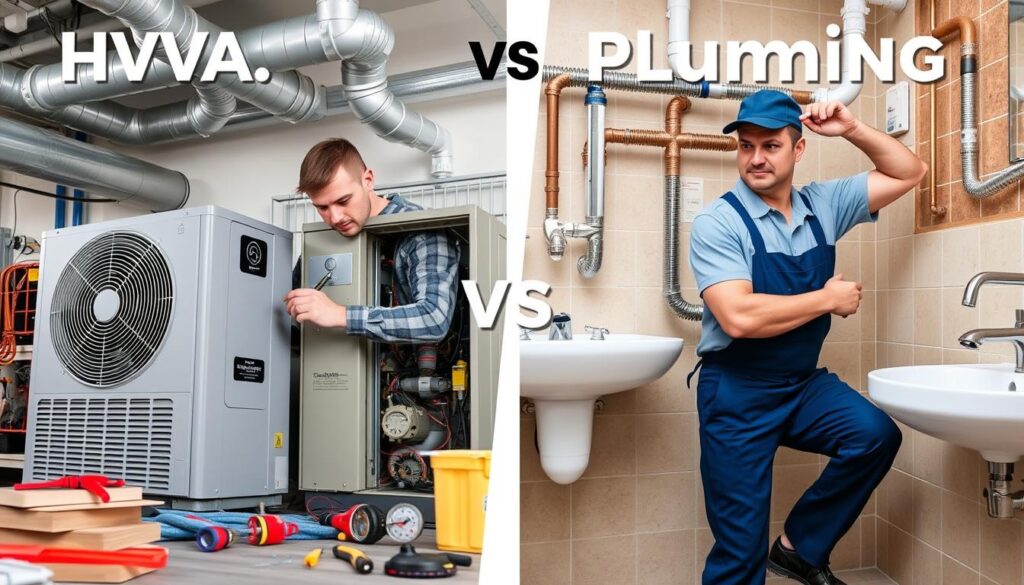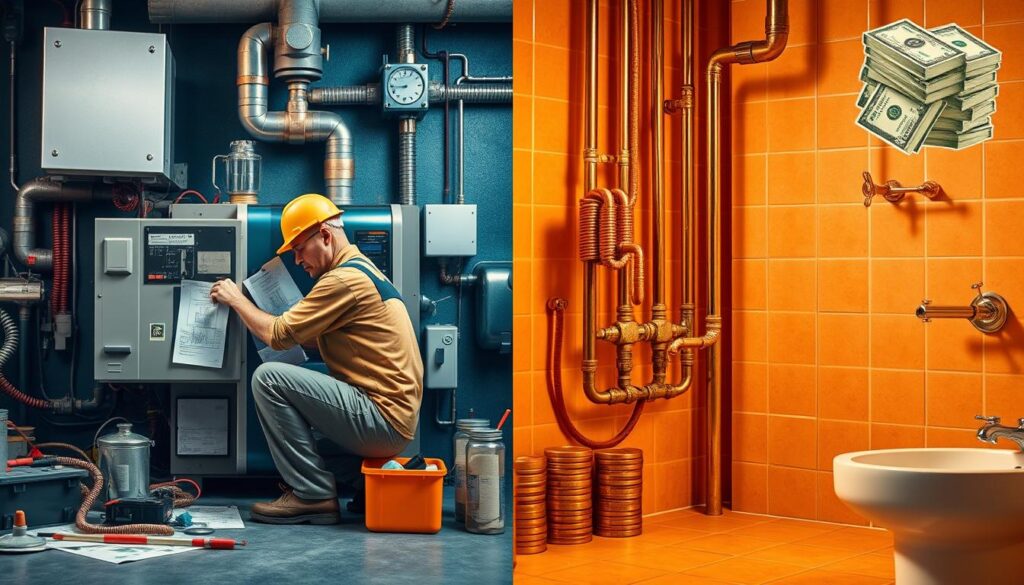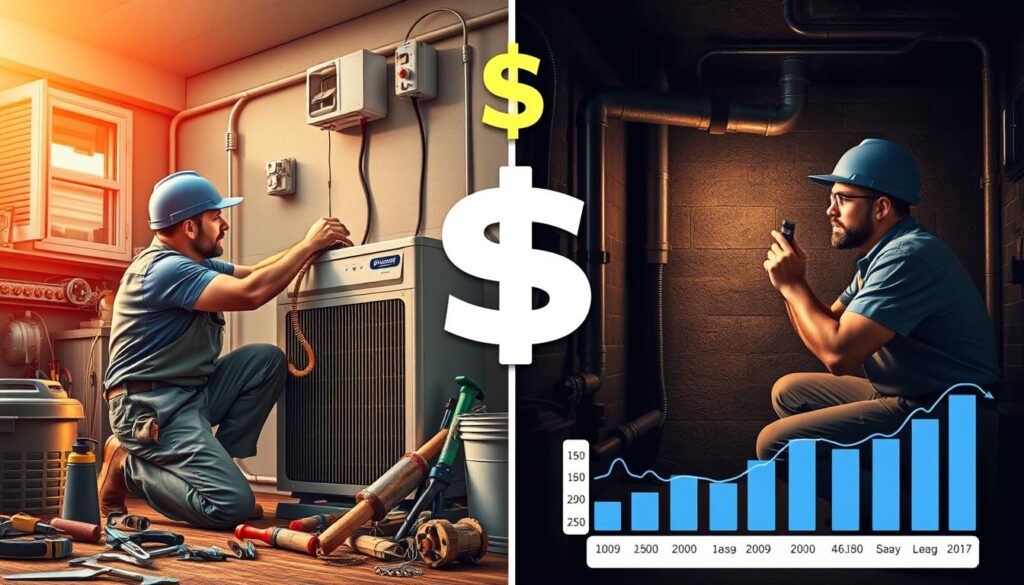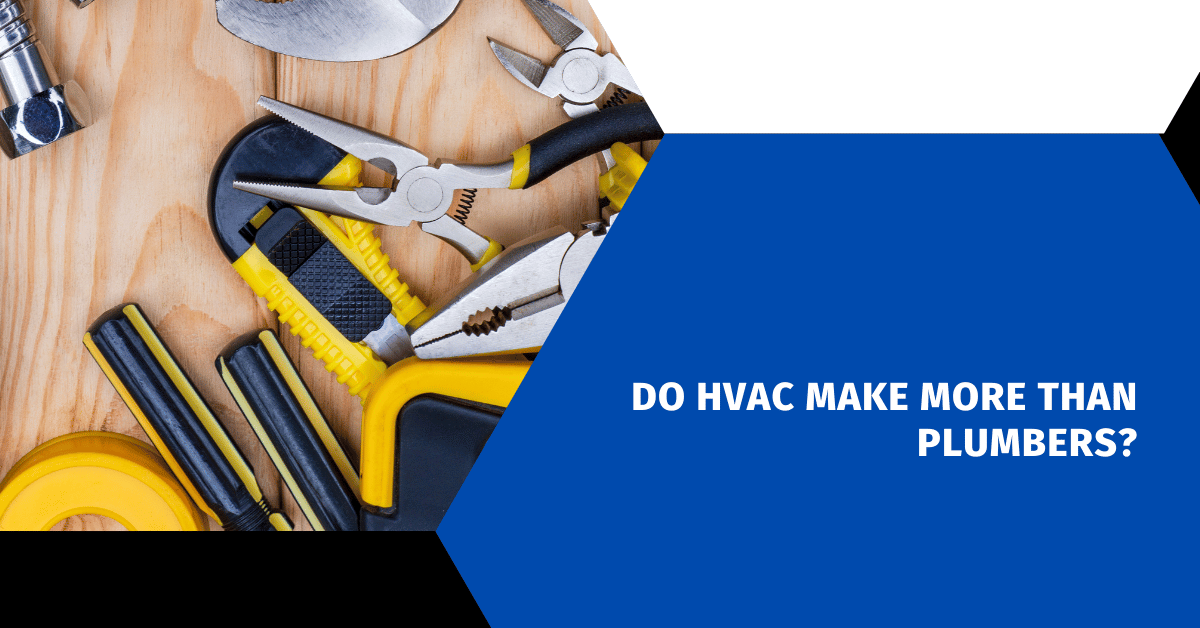Affiliate Disclosure
HVAC Guide Guys is a participant in the Amazon Services LLC Associates Program, an affiliate advertising program designed to provide a means for sites to earn advertising fees by advertising and linking to Amazon.
Do HVAC Make More Than Plumbers? When exploring skilled trades, many wonder: do HVAC techs earn more than plumbers? The truth is, it’s not that straightforward. Both trades offer stable jobs and decent pay. Yet, earnings can differ a lot based on experience, specialization, and where you work.
In this detailed look, we’ll examine current salary trends and job market insights. We’ll also explore the main differences between HVAC and plumbing. If you’re thinking about switching careers or just curious about their pay, this guide will help. It will reveal the financial aspects of each trade in 2024 and beyond.

Key Takeaways
- HVAC techs and plumbers both have stable, sought-after careers with good pay.
- Salaries can change a lot based on experience, specialization, and where you work.
- HVAC work is often seen as more versatile, covering electrical, refrigeration, and more.
- Plumbers can earn more at senior levels, with some making over $100,000 a year.
- The job outlook for both HVAC and plumbing is strong, with growth expected in the future.
Table of Contents
Understanding the Basics of HVAC and Plumbing Careers
HVAC technicians and plumbers are key in keeping our places comfortable and working right. They do different jobs, need different skills, and work in different ways. This affects how much they earn.
Key Differences in Job Responsibilities
HVAC technicians work on heating, ventilation, and air conditioning systems. They use special tools to control temperatures. Plumbers, however, fix water, drainage, and sewage systems. They use tools like pipe wrenches.
Required Skills and Qualifications
Both HVAC technicians and plumbers must follow strict safety rules. HVAC workers handle electrical parts and refrigerants. Plumbers deal with sewage, which can be dangerous. Getting certified and keeping up with new tech is important for both.
Industry Overview
In the US, plumbers make about $56,000 a year. The best earners make up to $75,000. Starting jobs pay around $42,000. HVAC technicians make about $52,000 a year, with overtime adding $6,000.
| Profession | Average Salary | Top 25% Earnings | Entry-Level Salary |
|---|---|---|---|
| Plumbers | $56,000 | $75,000 | $42,000 |
| HVAC Technicians | $52,000 | N/A | $48,630 |
The jobs, skills, and work environments of HVAC technicians and plumbers differ. Knowing these differences helps when choosing a career and thinking about pay.
Explore Our HVAC Shop
Looking for top-rated HVAC tools, parts, and accessories? Visit our shop and find the perfect solution for your needs.
Visit the ShopCurrent Salary Trends in Both Trades
The Bureau of Labor Statistics has shared some key insights on salaries for HVAC technicians and plumbers. HVAC technicians make $50,590 a year, or $24.32 an hour. Plumbers earn a bit more, at $59,880 annually, or $28.79 per hour. Electricians also make around $60,040 a year, or $28.87 an hour.
Many things affect these salaries. Location, experience, special skills, and union membership play big roles. For instance, HVAC techs in Phoenix make about $50,070 a year. Electricians there earn a mean wage of $49,620.
The job outlook is also different. Electricians are expected to see an 11% increase in jobs by 2033. HVAC techs and plumbers are looking at 9% and 6% growth, respectively.
| Occupation | Median Annual Salary | Median Hourly Wage | Projected Job Growth (2023-2033) |
|---|---|---|---|
| HVAC Technicians | $50,590 | $24.32 | 9% |
| Plumbers | $59,880 | $28.79 | 6% |
| Electricians | $60,040 | $28.87 | 11% |
Even though HVAC techs might earn less than plumbers and electricians, the job outlook is still good. Your location, experience, and skills can greatly affect how much you earn in these trades.
Geographic Impact on Earnings Potential
The money you can make as a plumbing contractor or in a trade career changes a lot based on where you are. For HVAC technicians, the best-paying places are often where living costs are high, like Alaska, Hawaii, and the District of Columbia. Plumbers, on the other hand, make the most money in states such as Illinois, Alaska, and Massachusetts.
It’s no surprise that cities usually pay more for both HVAC techs and plumbers. This is because living costs are higher and there’s more need for skilled workers in crowded places. In contrast, rural areas might pay less, but they often have lower living costs and less competition for jobs.
| Top-Paying States for HVAC Technicians | Highest-Paying Regions for Plumbers |
|---|---|
| 1. Alaska 2. Hawaii 3. District of Columbia | 1. Illinois 2. Alaska 3. Massachusetts |
Knowing how where you live affects your earnings is key if you’re thinking about a career in plumbing or HVAC. By looking into the top-paying areas, you can choose where to look for jobs. This might help you earn more as a plumbing contractor or in a trade career.
Experience Levels and Income Growth
Experience is key in the skilled trades when it comes to making money. At first, hvac technician salary and plumber salary are similar. But, as you gain more experience, the difference in skilled trade wages grows.
Starting out, apprentice HVAC technicians and plumbers make about $38,000 to $45,000 a year. But, as you move up, your earnings can soar. Mid-career folks with 5-10 years of experience can make $50,000 to $70,000. This depends on their specialty and where they work.
At the top, senior roles bring in the most money. Master electricians, plumbing supervisors, and HVAC experts in green energy or complex systems can earn $70,000 to $90,000 a year. Your salary can go up based on demand, location, and your skills.
No matter your experience, keeping learning and getting certified can boost your skilled trade wages. HVAC and plumbing offer great chances for career growth and higher earnings over time.
“The demand for skilled tradespeople, like HVAC technicians and plumbers, is only expected to grow in the coming years. By investing in your education and experience, you can position yourself for long-term financial stability and career fulfillment.”
Explore Our HVAC Shop
Looking for top-rated HVAC tools, parts, and accessories? Visit our shop and find the perfect solution for your needs.
Visit the ShopDo HVAC Make More Than Plumbers: A Detailed Analysis
The earnings of HVAC technicians and plumbers are complex. Starting salaries are often the same, but their career paths differ. As they gain experience, their earnings can change.
Entry-Level Comparison
At the start, HVAC and plumbing jobs pay about the same. They both begin at $30,000 to $40,000 a year. This is because they require similar skills and training.
Mid-Career Earnings
As they gain more experience, the pay gap grows. Plumbers usually earn more than HVAC workers. Plumbers make about $56,330 a year, while HVAC workers make around $50,590.
Senior-Level Income Potential
At the top, the pay can vary a lot. HVAC workers with special skills or certifications might earn more. On the other hand, master plumbers can make up to $92,618 a year.
Choosing between HVAC and plumbing should be based on your interests and goals. Both careers offer growth and financial stability.
Benefits and Additional Compensation
Thinking about a career in the trades? The benefits package can greatly affect your earnings. HVAC technicians and plumbers get perks like health insurance, retirement plans, paid vacation, and company vehicles.
HVAC techs earn over $55,000 a year, while plumbers make about $48,730. HVAC techs often get more benefits, which boosts their pay.
- Health insurance and retirement plans are common for both HVAC techs and plumbers.
- HVAC techs might get company vehicles or tool allowances, adding to their pay.
- Union jobs usually offer better benefits than non-union ones.
The benefits you get can change based on your employer, location, and if you’re in a union. It’s smart to look at the whole compensation package, including salary and benefits, when choosing a career.
| Benefit | HVAC Technicians | Plumbers |
|---|---|---|
| Health Insurance | Commonly Provided | Commonly Provided |
| Retirement Plans | 401(k), Pension, etc. | 401(k), Pension, etc. |
| Paid Time Off | Vacation Days, Sick Leave | Vacation Days, Sick Leave |
| Company Vehicles | Often Provided | Less Common |
| Tool Allowances | Frequently Offered | Less Frequent |
| Union Benefits | More Comprehensive | More Comprehensive |
Knowing the full compensation, including trade career earnings and benefits, helps you make better choices. It’s key for understanding your HVAC technician salary, plumber salary, and career path in the trades.

Explore Our HVAC Shop
Looking for top-rated HVAC tools, parts, and accessories? Visit our shop and find the perfect solution for your needs.
Visit the ShopUnion vs Non-Union Income Differences
In the skilled trades, choosing between union and non-union jobs affects your pay. Union jobs often pay more and offer better benefits because of union strength. But, you have to pay union dues from your earnings.
Non-union workers might negotiate their salaries better. Yet, they could lose out on benefits like guaranteed raises and health plans. The effect of union membership on your hvac vs plumbing income depends on your area and trade.
Union Benefits Overview
Union HVAC and plumbing workers get several perks:
- Guaranteed pay raises and overtime pay at time and a half (or sometimes double time)
- Employer-sponsored health, dental, and pension benefits
- Contracted working conditions with set start and end times, paid holidays, and vacation time
- Access to high-quality training programs offered by the union
- Job security and negotiation support in case of disputes with employers
Non-Union Opportunities
Non-union shops might pay more at first, especially for beginners. But, union workers usually catch up and earn more, thanks to their benefits. Non-union workers, however, can negotiate salaries and might earn more over time if they’re skilled.
Collective Bargaining Impact
Being in a union can greatly impact your skilled trade wages. HVAC union technicians start at about $15 an hour as helpers. After 4-5 years, they make over $42 an hour. Union dues are 30 cents to 45 cents per hour, plus 0.75 percent of their pay, about $30 monthly for new helpers.
Non-union shops might start you at a lower level based on experience, cutting your pay at first. But, talented technicians in non-union shops can earn more over time. Starting in a union can help your career grow in the long run.
Specialization and Its Effect on Income
In the HVAC and plumbing fields, specializing can really up your earnings. HVAC techs who focus on energy-efficient systems or smart homes can earn more. Plumbers who work on big commercial projects or industrial systems also make more than those doing residential work.
Learning new skills and getting certified is key to making more money. Getting trained in areas like backflow prevention or medical gas installation can make you stand out. This can lead to better pay and more job opportunities.
- Specialized HVAC techs with skills in energy-efficient systems or smart homes can earn more.
- Plumbers who work on big commercial or industrial projects often earn more than those in residential services.
- Learning new skills and getting certified is crucial for increasing your income through specialization.
By growing your skills, you become more valuable in the HVAC or plumbing world. This means you can earn more and have a more secure job. Specializing not only boosts your pay but also lets you offer more specialized services to clients.
“Specialization is the key to unlocking your true earning potential in the skilled trades. The more you invest in developing your expertise, the more valuable you become to your employer or clients.”
| Position | Average Salary |
|---|---|
| Entry-level HVAC Technician | $52,000 |
| Intermediate HVAC Technician (2-4 years) | $59,600 |
| Senior HVAC Technician (4-6 years) | $68,100 |
By focusing on specialized skills and services, HVAC techs and plumbers can greatly increase their income and job security in the skilled trades industry.
Overtime and Emergency Work Compensation
In the HVAC and plumbing trades, technicians can earn more from overtime and emergency work. Rates for after-hours service are often higher, especially for emergency calls. Holiday pay can also increase earnings for those on call during holidays.
On-call work can disrupt personal life but offers more earnings. The pay for emergency work varies between HVAC and plumbing. Yet, the chance for extra income is big for those ready to work outside regular hours.
After-Hours Service Rates
HVAC and plumbing technicians earn more for service calls outside regular hours. These after-hours service rates can greatly increase their earnings. This is especially true for emergency visits during nights, weekends, and holidays.
Holiday Pay Differences
Holiday pay for HVAC and plumbing pros can differ. Some employers offer holiday pay premiums that are 1.5 or 2 times the regular rate. Others might give compensatory time off instead. Knowing your employer’s holiday pay policies can help you earn more.
On-Call Income Potential
Being on call for emergencies can disrupt life but offers big income chances. The pay for these calls varies. Yet, they can significantly boost a technician’s residential service technician earnings.

Future Job Market Outlook and Salary Projections
The future looks bright for HVAC technicians and plumbers. The Bureau of Labor Statistics says their jobs will grow by 5% in the next decade. This is an average rate. Electricians might see a bit more growth, at 9%.
Several things are making these jobs more appealing. Old buildings need fixing, and we want to use less energy. New tech is also creating more jobs. So, salaries for HVAC and plumbing jobs are likely to go up.
| Occupation | Projected Job Growth (2019-2029) | Median Annual Wage (2020) |
|---|---|---|
| HVAC Technicians | 4% | $50,590 |
| Plumbers | 4% | $55,160 |
| Electricians | 9% | $56,900 |
New HVAC workers can earn about $15 per hour. More experienced ones can make up to $30 per hour. In big cities, they can earn even more because there are more jobs.
HVAC workers can also get benefits like health insurance and retirement plans. Plumbers in New Jersey make the most money, followed by Alaska, Connecticut, Hawaii, and Massachusetts.
The job outlook for HVAC and plumbing is good. There will be steady growth and good pay in the future. The need for energy efficiency, fixing old buildings, and new tech will keep these jobs in demand.
Explore Our HVAC Shop
Looking for top-rated HVAC tools, parts, and accessories? Visit our shop and find the perfect solution for your needs.
Visit the ShopTraining Costs vs Return on Investment
Starting a career in skilled trades like HVAC or plumbing means spending money on training first. But, this cost can lead to big benefits later. You’ll find steady work, good pay, and chances to move up in your career.
Trade careers offer a big plus: apprenticeships. These programs give you paid training on the job. This helps cut down the cost for those starting out. Technical schools also help you get to work faster and earn a good income sooner.
Studies show that trade school costs about $33,000, including tuition and fees. This is much less than the $103,456 for a four-year college degree. So, trade careers are a smart choice for those looking for a cheaper way to a good job.
Both HVAC and plumbing careers offer a good return on investment. They have steady jobs and the chance to make more money over time. Plumbers, pipefitters, and steamfitters made $25.92 an hour, or $53,910 a year in 2018. In places like New York, they made up to $76,410.
While there are costs and ongoing education needs, the long-term benefits are worth it. Trade career earnings offer a fulfilling and well-paying job path.
“I never thought I’d be earning $40 per hour as a plumber, but the training I received at LaGuardia Community College has paid off tremendously. The hands-on experience and support from my instructors have allowed me to thrive in this industry.”- Natalie Kavral, former nursing student turned plumber
Conclusion
When we look at the earnings of HVAC technicians and plumbers, it’s hard to say who makes more. Both jobs pay well and have good job security. But, your pay can change based on where you work, how long you’ve been doing it, what you specialize in, and if you’re in a union.
Plumbers might earn a bit more, with an average salary of $54,620 a year. But HVAC technicians make about $46,880. Still, the choice between these jobs should depend on what you enjoy doing, your skills, and where you see your career going. Both paths can lead to financial stability and growth.
In the end, both HVAC and plumbing careers are rewarding and can be very profitable. If you’re willing to focus on a specific area, take on more work, and gain experience, you can earn a lot. No matter which path you pick, you’ll have a fulfilling job in the skilled trades.

